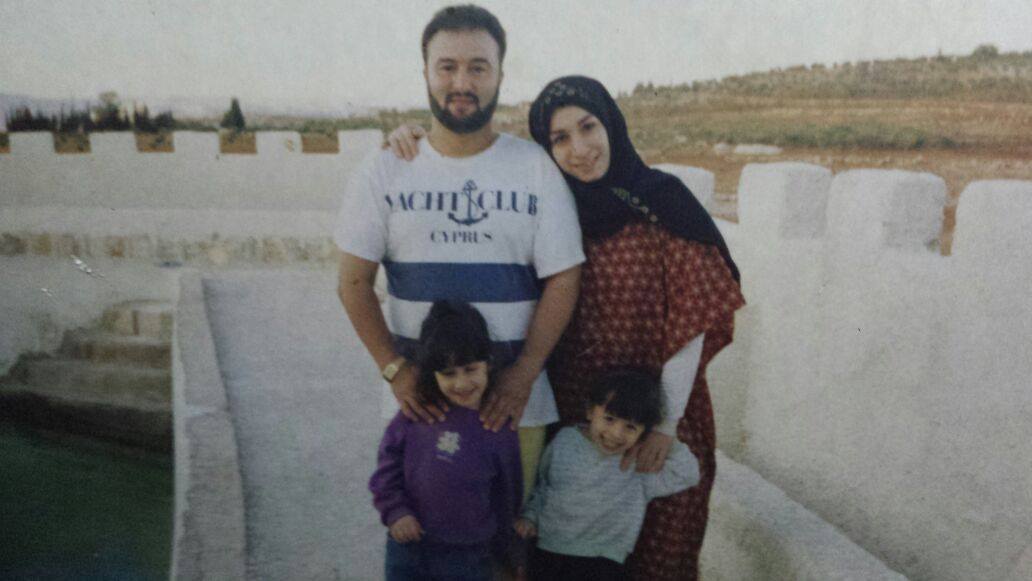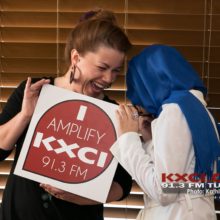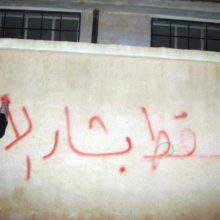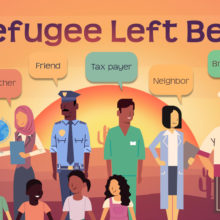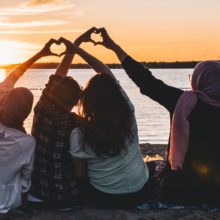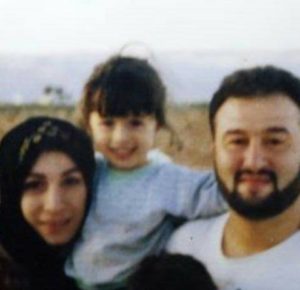
In episodes 4-5 of Mn Huna: Finding Refuge in Friendship, Houda begins to talk about the unraveling of her childhood in Aleppo.
Houda grew up in the apartment below her four cousins, who are similar ages to Houda and her sisters. They were in and out of each other’s homes constantly—a tight-knit extended family. And they expected to keep growing up together and growing old together, as Syrian families frequently do. They were happy.
The unrest of the Arab Spring didn’t reach Aleppo right away. Other cities—Daraa and Homs—felt it first. In the spring of 2011, there were protests. People were shot and killed. Arrested and disappeared.
In August, shortly before Houda turned 14, the first protests began in Aleppo. Her family had heard the stories of what happened in Daraa and Homs. They saw the changes happening around them. Houda’s safe childhood began to come apart.
Houda’s Belgian uncle no longer felt safe in Syria, so her beloved cousins and their parents left the country. Houda’s heart broke for the first time.
She thought that was the worst thing that could happen.
هدى/Houda: من هنا : اقول ان الظلم لا يدوم
Melanie/ميلاني: From here, we know injustice will not last.
Listen Now
Transcript
Melanie: Hi, my name is Melanie.
Houda: Hi, my name is Houda.
Melanie: And you are listening to
Houda: Mn Huna
Melanie: Finding Refuge in Friendship.
Houda: Isme, Houda.
Melanie: Isme, Melanie. So Houda, tell me about Fridays in Syria.
Houda: Fridays in Syria was a holiday for Syrian people and for me was very fun and for my cousins because we went together to picnic, to park. And very important for men because they went to pray at the mosque.
Melanie: So Fridays were really important and special day for your family to get together and enjoy each other’s company and pray. Your cousins actually lived very close to you.
Houda: They lived in same building. They lived in second floor, so always we play together and eat together and planned for future also together.
Melanie: Houda as you remember is from Aleppo. In 2011 things started to change. In March of 2011, was the beginning of protests against the government. It was the Arab Spring. And in Aleppo there started to be arrests. People were disappearing off the street. It started to become dangerous and frightening. So in 2011 when Houda was 14, in September of that year, her life started to change a lot.
Houda: Their Father from Belgica so very dangerous to stay in Aleppo because they from different country so problem for them.
Melanie: So yeah their Dad is Belgian so as things started to get frightening he took his family and they went to Belgium. Then a couple months later your Father got up to go to mosque but he did something a little bit different that Friday.
Houda: Every Friday, usually we were sleeping but in Friday my Dad go to my bedroom and wake up me and my sisters and my Mom and say good bye and hugged to us. And he went to mosque.
Melanie: So you think your Dad was worried. He was afraid, maybe, that Friday.
Houda: Yeah.
Melanie: And Fridays had changed in Aleppo already.
Houda: Friday become like doomsday because every Friday happened shooting and arrests so this day was different and dangerous day.
Melanie: So your Father went to mosque, after saying good bye and then later in the day he came back home.
Houda: My Dad back to home but he was in street. So happened like riot and come police and police arrested people. So between these people, old man. The police arrested this man. So my Dad could not see people old people arrested told to policeman this not fair and you cruel. So when my Dad told this the police also arrested my Dad.
Melanie: While this was happening, where was your Mom and your sisters and you?
Houda: We were in our balcony. My Mom and my sisters saw my Dad when the police arrested him. Me I was in place I could not see when take my Dad. Then my Mom and my sister started screaming. My Mother was very strong because she talk with policeman and talk about my Dad, “He didn’t do anything. Why arrested my husband?”
Melanie: So your Mom and your sisters were screaming and you had a different reaction.
Houda: I did not cry. I felt like a coma condition.
Melanie: So you were numb. You thought you would not see your father again.
Houda: We think my Dad didn’t return to my home because we see news in other city if people go to police, no return. We think impossible to back to home. But the goodness was with me and with my family.
هدى/Houda: من هنا : اقول ان الظلم لا يدوم
Melanie/ميلاني: From here, we know injustice will not last.
